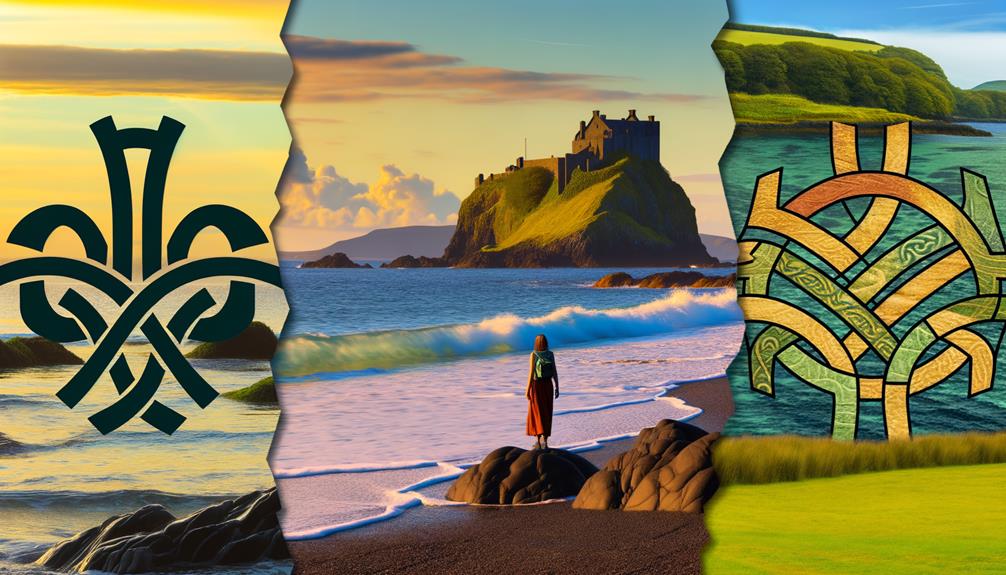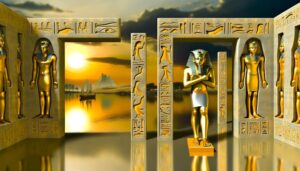Meaning of the Name Ronan
The name Ronan originates from the ancient Gaelic word 'Rónán,' meaning 'little seal.' It combines 'rón' (seal) with the diminutive suffix '-án.' This etymological form reflects the Gaelic tradition of animal-related names. Historically, Ronan has been borne by notable figures, particularly in Irish monastic traditions, such as Saint Ronan of Locronan.
Over time, its popularity has experienced resurgence, embracing both historical depth and contemporary relevance. Variations include 'Rónán' and the diminutive 'Ronnie.' The name has also permeated modern culture through literary and media representations.
Its journey through linguistic and cultural evolution is quite fascinating.

Key Takeaways
- Ronan originates from the Gaelic word 'Rónán,' meaning 'little seal.'
- The name combines 'rón' (seal) with the diminutive suffix '-án.'
- Historically, it is associated with several Irish saints and monastic figures.
- Ronan signifies a blend of nature and cultural heritage in Irish nomenclature.
- The name is popular in contemporary culture and media, retaining its historical essence.
Origins of Ronan
The name Ronan originates from the ancient Gaelic language, specifically deriving from the Irish word 'Rónán,' which means 'little seal.'
This nomenclature is deeply rooted in Irish culture and history, reflecting the significance of seals in Celtic mythology and coastal life.
The name's historical usage can be traced back to early medieval Ireland, where it was often bestowed upon saints and notable figures, signifying protection and a deep connection to the natural world.
Ronan's etymological journey through centuries highlights the linguistic evolution of Gaelic names and their enduring legacy.
The survival and continued popularity of the name Ronan underscore its cultural resonance and the rich tapestry of Gaelic linguistic traditions that have shaped modern Irish identity.
Etymology and Meaning
Ronan, derived from the Irish 'Rónán,' combines 'rón,' meaning 'seal,' with the diminutive suffix '-án,' effectively translating to 'little seal.'
This etymological construction reflects the Gaelic tradition of attributing animal characteristics to names, a common practice in early Irish culture.
The use of 'rón' signifies a direct connection to the natural world, while '-án' imparts a sense of endearment or smallness. The name thereby encapsulates both a literal and affectionate meaning, indicative of the linguistic nuances within the Irish language.
Understanding the construction of 'Ronan' offers insight into the cultural and linguistic practices that shaped Irish nomenclature, highlighting the blend of nature and language in personal identifiers.
Historical Significance
Throughout history, the name Ronan has been borne by several notable figures, particularly within Irish monastic and ecclesiastical traditions. One prominent example is Saint Ronan of Locronan, a 6th-century hermit who played a significant role in spreading Christianity in Brittany.
The name Ronan, derived from the Old Irish 'Rónán,' meaning 'little seal,' was popular among early Irish saints and monks, reflecting the spiritual and cultural milieu of the time.
Additionally, Saint Ronan of Iona, another 7th-century ecclesiastical figure, is remembered for his contributions to monastic life and religious scholarship. These historical instances underscore the name's deep roots within the religious and cultural histories of Ireland and its surrounding regions, emphasizing its enduring significance.
Cultural Impact
Frequently celebrated in literature, media, and folklore, the name Ronan has transcended its historical origins to achieve a lasting presence in contemporary culture. Its etymology traces back to the Old Irish "Rónán," denoting "little seal." This moniker has been embraced in various cultural artifacts, from ancient legends to modern storytelling.
| Medium | Example | Impact |
|---|---|---|
| Literature | "The Song of Ronan" | Highlights the heroic nature |
| Media | "Guardians of the Galaxy" | Portrays Ronan as a formidable figure |
| Folklore | Irish Legends of Saint Ronan | Emphasizes spiritual and moral virtues |
Thus, Ronan remains a name imbued with rich cultural significance, resonating through time.
Popularity Over Time
Examining the popularity of the name Ronan reveals intriguing historical name trends and modern usage patterns.
Historically rooted in Irish culture, Ronan has experienced varying degrees of favor, with significant peaks corresponding to periods of Gaelic revival.
In contemporary times, the name has seen a resurgence, influenced by global cultural exchange and media representation.
Historical Name Trends
The name Ronan, rooted in Irish tradition, has experienced fluctuating levels of popularity across different historical periods, reflecting broader cultural and societal shifts. Originating from the Old Irish “Rónán,” meaning “little seal,” its usage has varied in response to historical influences.
- Medieval Period: During the early medieval era, Ronan was a common name among Irish saints and scholars, signifying its cultural and religious significance.
- 19th Century: The name saw a decline during the 19th century, coinciding with the Great Famine and subsequent emigration, which led to a dilution of traditional Irish names.
- 20th Century Resurgence: A revival occurred in the mid-20th century, driven by a renewed interest in Irish heritage and the global rise of Celtic cultural appreciation.
Modern Usage Patterns
In contemporary times, the name Ronan has witnessed a steady increase in popularity, reflecting a broader trend of embracing culturally rooted and historically significant names. Originating from the Irish word "Rónán," meaning "little seal," Ronan carries a rich linguistic heritage. The resurgence in its usage can be attributed to a growing appreciation for names with profound etymological backgrounds and unique phonetic qualities.
| Year | Popularity Rank (US) | Notable Influence |
|---|---|---|
| 2000 | 987 | Emergence in literature |
| 2010 | 456 | Rise of Celtic culture |
| 2020 | 267 | Increased media presence |
This trend mirrors a wider societal shift towards valuing names that encapsulate cultural identity and historical resonance, making Ronan a compelling choice for modern parents.
Ronan in Literature
The name Ronan has been imbued with symbolic significance across various literary works, reflecting its historical and cultural resonance.
Notable literary characters named Ronan often embody traits of strength and wisdom, echoing the name's Celtic origins meaning 'little seal.'
Moreover, the etymology of Ronan frequently surfaces in texts, highlighting its linguistic journey and enduring appeal.
Ronan's Symbolic Significance
Ronan's symbolic significance in literature often draws from its historical and etymological roots, evoking themes of strength, protection, and a deep connection to nature. Historically, the name Ronan is derived from the Old Irish 'Rónán,' meaning 'little seal.' This etymology underscores a profound bond with the natural world, particularly the sea.
The symbolic resonance of Ronan in literary contexts can be understood through:
- Strength and Resilience: The seal's tenacity in harsh environments mirrors human perseverance.
- Protection: The name suggests a guardian-like presence, often associated with familial or communal safety.
- Nature: Reflecting an intrinsic link to the earth and sea, Ronan characters often embody a harmonious relationship with their surroundings.
These elements enrich the narrative depth of characters named Ronan.
Notable Literary Characters
Prominent literary figures named Ronan often embody the symbolic attributes of strength, protection, and a deep affinity with nature, reflecting the name's historical and etymological significance.
In Maggie Stiefvater's 'The Raven Cycle,' Ronan Lynch exemplifies resilience and a potent connection to the mystical and natural domains, aligning with the name's roots in ancient Irish culture.
Similarly, in the fantasy series 'The Legends of Muirwood' by Jeff Wheeler, Ronan, a steadfast and courageous character, upholds these intrinsic qualities.
These characters are often portrayed as guardians or warriors, resonating with the meaning 'little seal' in Gaelic, where seals are seen as protectors of the sea.
Therefore, literary Ronans are often depicted as robust, nature-bound figures, epitomizing their etymological heritage.
Ronan's Etymology in Texts
Examining the etymology of the name Ronan in literature reveals a rich tapestry of linguistic precision and historical context that underscores the name's profound cultural significance. Derived from the Old Irish word 'Rónán,' the name Ronan translates to 'little seal,' reflecting its roots in Gaelic culture.
Historical texts and literary works often highlight the following:
- Medieval Chronicles: Early Irish manuscripts frequently reference saints named Ronan, emphasizing the name's ecclesiastical heritage.
- Literary Adaptations: Modern novels and poems draw upon Ronan's etymological depth, using the name to evoke themes of resilience and mysticism.
- Cultural Narratives: Folklore and oral storytelling traditions incorporate the name Ronan, reflecting its enduring presence in Celtic mythology.
Each instance underscores Ronan's lasting influence across literary genres.
Famous People Named Ronan
Among those who bear the name Ronan, several individuals have achieved significant renown in various fields, illustrating the diverse impact of this storied title. Ronan Farrow, an acclaimed journalist and lawyer, has gained prominence through his investigative reporting on critical social issues. His work has earned him prestigious accolades, including a Pulitzer Prize.
In the domain of music, Ronan Keating stands out as a celebrated singer-songwriter and member of the Irish pop group Boyzone, whose melodic contributions have resonated globally.
The name also graces the world of literature with Ronan Bennett, an esteemed novelist and screenwriter known for his incisive narratives. These notable figures underscore the cultural and professional versatility inherent in the name Ronan.
Variations and Nicknames
The name Ronan, steeped in Gaelic origins, has spawned various forms and affectionate diminutives, reflecting its linguistic adaptability and enduring charm. Originating from the Old Irish "Rónán," meaning "little seal," the name has been embraced across cultures, leading to several notable variations and nicknames. These adaptations serve not only to personalize the name but also to preserve its historical essence while allowing for modern usage.
Here are three common variations and nicknames:
- Rónán: The original Gaelic form, retaining its authentic pronunciation.
- Ronnie: A popular diminutive, often used affectionately in English-speaking countries.
- Ronan: The anglicized version, widely accepted and used internationally.
These variations exemplify the name's versatility and timeless appeal.
Ronan in Modern Culture
Ronan's linguistic adaptability and rich historical roots have paved the way for its significant presence in modern culture. Derived from the Old Irish 'Rónán,' meaning 'little seal,' the name carries both a sense of endearment and an ancient heritage.
In contemporary times, Ronan is embraced across various cultural landscapes, from literature to popular media. Prominent figures include Ronan Keating, a influential Irish singer, and Ronan Farrow, an acclaimed journalist. Fictional representations, such as Ronan the Accuser in Marvel Comics, further amplify its presence. These associations contribute to the name's enduring popularity, reflecting a blend of tradition and modernity.
Consequently, Ronan continues to resonate with parents seeking a name that embodies historical depth and contemporary relevance.
Conclusion
The name Ronan, derived from the Old Irish word 'Rónán,' meaning 'little seal,' carries rich historical and cultural significance.
Rooted in ancient Irish traditions, it has endured through centuries, capturing the imagination in literature and modern culture alike.
For instance, consider Ronan Daly, a young poet whose evocative works echo the name's historical depth and contemporary resonance, illustrating its enduring appeal and multifaceted nature.
The name Ronan remains a tribute to its linguistic and cultural heritage.






